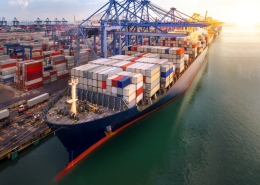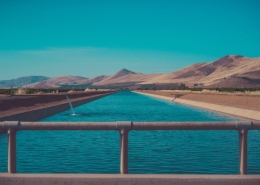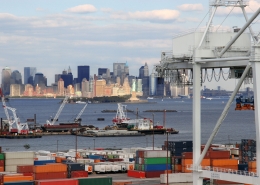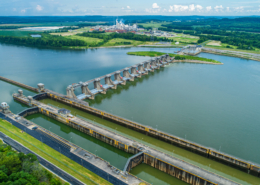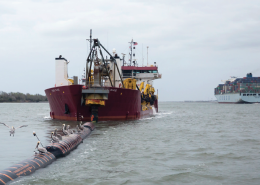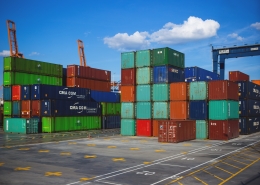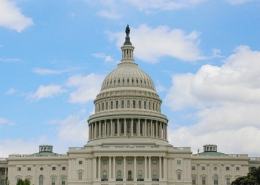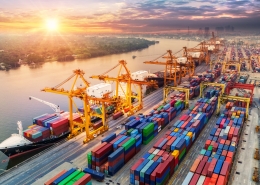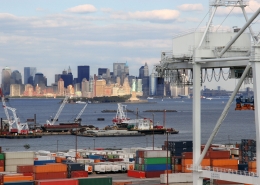On Wednesday, December 13th, Chairman David Rouzer (R-NC) convened the House Subcommittee on Water Resources and Environment for the second in a series of hearings to prepare for the Water Resources Development Act of 2024 (WRDA), which Congress works to pass on a biennial basis.
The first hearing was held on December 5th to gather input directly from the Army Corps of Engineers on WRDA related activities. This hearing, “Proposals for a Water Resources Development Act of 2024: Stakeholder Priorities,” aimed to gain a better understanding of stakeholder experiences and needs for the upcoming WRDA legislation. The hearing included invited testimony from the following witnesses:
- Mr. Shane Kinne, Executive Director, Coalition to Protect the Missouri River
- Ms. Teresa Batts, Mayor, Surf City, North Carolina
- Mr. Jim Weakley, President, Lake Carriers’ Association
- Mr. Paul Anderson, President and Chief Executive Officer, Port Tampa Bay
- Mr. Dave Mitamura, Executive Director, National Water Supply Alliance
The U.S. Army Corps of Engineers (ACE) is responsible for engineering infrastructure projects around the country, and world, which “strengthen national security, energize the economy, and reduce risks from disasters.” Some of the projects undertaken by the ACE include the maintenance of U.S. inland waterways, maintenance of 926 harbors (spread across coastal, Great Lakes, and inland locations), the dredging of materials for shipping, construction and maintenance of dams, coastal resiliency fortifications, and water supply provision. The Corps also maintains an environmental emphasis, engaging in projects to protect and enhance thousands of acres of wetlands in the U.S.
Congress began tasking the Corps with these missions with periodic “river and harbor” bills in the 1820s. Organized national flood control legislation followed in the 20th Century, as did other legislative mandates for the Corps to protect coastlines and provide other services. These various kinds of project- and policy-based authorization coalesced into recurring Water Resources Development Acts, starting with the 1986 law. This legislation was passed in response to a number of issues, including aging water infrastructure (such as locks and dams), the perceived lack of prioritization of navigation projects, vagueness in project selection and national impact, and an overall need for better planning. Since that time, Congress has revisited the WRDA legislation with greater frequency to better maintain and monitor water infrastructure, and since 2014, Congress has placed a great emphasis on passing this legislation on a biennial basis.
This conflict between infrastructure needs and environmental/resource preservation remains an issue today. The full Transportation and Infrastructure Committee Chair Sam Graves (R-MO) was present for the hearing, and during his opening comments, in talking about the Missouri and Mississippi Rivers which border his district, he detailed his concern that current river management practices prioritize fish and wildlife over the security of people and communities.
A hint of a similar theme carried through this hearing, which Rep. Grace Napolitano (D-CA) described as a crossroads for the Corps and policymakers as we rethink the role of the Corps related to water supply, conservation, and insecurity. There was minimal, if any, disagreement amongst members and panelists that ACE work in all areas is critical and that the project undertakings are vital, but there were differences in the weighting of topics under the Corps’ prioritization umbrella. While some panelists covered the more traditional topics like dredging, dams, and flood control, one panelist talked about water insecurity, water conservation and protection, and the need for these water projects to be elevated to an equal footing as the projects considered more traditional.
Infrastructure
Panelists discussed needs like improving aging dams, working on coastal resiliency, flood control efforts in the face of extreme weather events, and dredging, dredging, dredging.
Jim Weakley, President of the Lake Carriers’ Association, touched on many of the critical issues in shipping. Shipping is a highly fuel- and cost-efficient method of moving goods, and the economic impact of this sector is immense for the U.S. A single thousand-foot bulk carrier freighter on the Great Lakes system can carry 70,000 tons, which would be equivalent to 40 river barges, 700 rail cars, or 2,800 trucks. The industry generates $36 billion in economic activity, producing significant tax revenue and well-paying jobs for many Americans. Weakley followed up these industry statistics with a comment on the importance of dredging activities, stating that each inch of lost channel depth leads to the offloading of 270 tons of cargo. If neglected, channels can eventually be rendered inefficient for shipping purposes, leading to broader economic impacts for the region and country.
Shane Kinne, Executive Director of the Coalition to Protect the Missouri River, echoed similar sentiments but touched upon a few other issues like water flows, bank erosion, and other funding needs. Kinne also touched on the vitality of a WRDA 2024, commenting on the need to maintain the momentum from the previous legislation and highlighting the ongoing resiliency studies detailing solutions which need to start moving through a planning a development process.
Teresa Batts, the Mayor of Surf City, North Carolina, and Paul Anderson, the President and Chief Executive Officer of Port Tampa Bay, similarly discussed infrastructure project and funding needs. Hurricane Florence, which slammed the eastern coast near Surf City in 2018, displayed the community’s obvious need for dune infrastructure and other coastal resiliency projects. Tampa Harbor, which generates significant economic impact for the region and country, needs to undertake a deepening project for the 47-mile-long ship channel.
Water Supply
The United States is facing a growing crisis related to water—an issue that is impacting regions of the country differently. Many western states are seeing hotter and dryer weather leading to water shortages and widespread drought. Many eastern states are seeing increases in rainfall which create other challenges to water infrastructure. Coupled with a growing population and overall demand for water and eroding pipes and infrastructure, water is a major source of concern, and Dave Mitamura, the Executive Director of the National Water Supply Alliance joined the panel to talk about those needs.
While Kinne touched on water issues related to water flow for river navigation, Mitamura discussed water from the people and conservation perspectives. Mitamura’s organization has a close working relationship with the Corps, but he discussed challenges with ACE resources and overall resources for water supply and conservation efforts. His stance throughout the hearing was that water projects deserve equal weight and consideration for ACE project prioritization and within Congressional prioritization and funding decisions. Within the Q&A portion of the hearing, Rep. Eleanor Holmes-Norton (D-DC) emphasized the complex issue of growing water challenges by noting that the District of Columbia is fully reliant on the Potomac River for drinking water, and DC Water maintains only one day of backup drinking water. The risks associated with these infrastructure limitations are great, and many cities and regions have experienced the repercussions of water infrastructure failures. (Aside from its nationwide missions, the Corps also created the national capital’s drinking water supply system, the Washington Aqueduct, in the 1850s.)
Through the differing perspective on Corps’ project funding priorities, there were a few things which remained constant throughout the hearing. Panelists were quick to applaud the ACE for designing and constructing critical projects and stepping up their levels of engagement in recent years. The Corps addresses many challenges with sometimes limited staffing and resources. Panelists also noted the importance of this legislation for the purpose of planning and consistent funding information, as well as the appreciation for the bipartisan effort required to pass this bill every two years. Inevitably, as water issues continue to grow, demand for this legislation, and associated funding, will be highly sought after.


